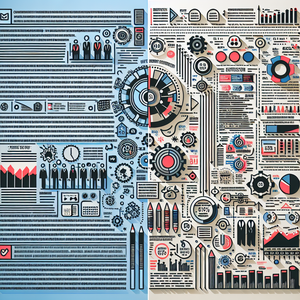The Future of Work: Emerging Professions in a Tech-Driven World

Historically, technological revolutions have led to the creation of new job sectors while rendering some traditional roles obsolete. The Industrial Revolution introduced manufacturing jobs, while the rise of the internet led to a surge in digital marketing and IT roles. Today, we find ourselves at the onset of a new wave characterized by AI and automation. According to a report from the World Economic Forum, it is estimated that by 2025, 85 million jobs may be displaced due to the shift in labor between humans and machines. However, this same shift is expected to create 97 million new roles that are more adapted to this new division of labor.
Emerging Professions
As businesses increasingly rely on AI to streamline operations and improve efficiency, the demand for machine learning experts is skyrocketing. These professionals design algorithms that allow machines to learn from data, leading to innovations across multiple sectors, including healthcare, finance, and marketing. For instance, AI specialists are pivotal in developing personalized medicine solutions that analyze patient data to suggest tailored treatments.
AI and Machine Learning Specialists
As businesses increasingly rely on AI to streamline operations and improve efficiency, the demand for machine learning experts is skyrocketing. These professionals design algorithms that allow machines to learn from data, leading to innovations across multiple sectors, including healthcare, finance, and marketing. For instance, AI specialists are pivotal in developing personalized medicine solutions that analyze patient data to suggest tailored treatments.
Data Analysts and Scientists
With the exponential growth of data, organizations need skilled data analysts and scientists to interpret complex datasets and derive actionable insights. This role is essential for informed decision-making and strategy development, making it a cornerstone of many emerging businesses. Companies like Amazon and Google rely heavily on data analytics to optimize their services and enhance user experience, demonstrating the critical nature of this profession.
Cybersecurity Experts
As cyber threats become more sophisticated, the need for cybersecurity professionals is critical. These experts protect sensitive information and infrastructure from attacks, ensuring that organizations can operate securely in an increasingly digital world. The rise of remote work has further accentuated this demand, with companies investing heavily in cybersecurity measures to safeguard their operations.
Robotics Engineers
The integration of robotics in various industries—from manufacturing to healthcare—has created a demand for robotics engineers. These professionals design and build robots that can perform tasks ranging from assembly line work to surgical procedures. The increasing automation of labor-intensive tasks is not only enhancing productivity but also opening up new avenues for innovation.
Sustainability Managers
With growing concerns over climate change, sustainability managers are becoming increasingly vital. These professionals develop strategies for organizations to reduce their carbon footprint and implement sustainable practices in operations, catering to a market that values environmental responsibility. Companies are now recognizing that sustainability is not just a trend, but a necessity for long-term success.
Skills for the Future
As we look toward the future job market, certain skills will become paramount across these emerging professions: Technical Proficiency: Familiarity with programming languages, data analytics tools, and AI applications will be critical. Continuous learning and adaptability will be essential for professionals aiming to stay relevant. For instance, knowledge of Python and R programming languages is increasingly sought after in data analysis roles. Critical Thinking and Problem-Solving: As automation takes over routine tasks, jobs will increasingly require humans to engage in complex problem-solving and critical thinking. The ability to analyze situations and derive innovative solutions will be invaluable. For example, AI professionals must constantly adapt algorithms based on real-time data and outcomes. Interpersonal Skills: Despite the rise of technology, human interaction remains essential. Skills such as communication, emotional intelligence, and collaboration will be necessary to work effectively in teams and engage with clients. In roles such as sustainability management, the ability to communicate effectively with stakeholders and influence decision-making is crucial.
The future of work is undeniably intertwined with technology. Emerging professions in AI, data analysis, cybersecurity, robotics, and sustainability are set to dominate the job market, creating exciting opportunities for those willing to adapt and learn. As we navigate this technological landscape, it is crucial that individuals invest in developing the skills necessary to thrive in these new roles. By embracing this change and preparing for the professions of the future, we can not only secure our own career paths but also contribute to a more innovative and sustainable world.
Machine Learning Engineer
Google, Facebook, startups focusing on AI-driven solutions
Core Responsibilities
Design and implement machine learning models and algorithms for various applications, including predictive analytics and natural language processing.
Collaborate with data scientists and software engineers to integrate machine learning solutions into existing products.
Optimize models for performance, scalability, and accuracy based on user feedback and real-world data.
Required Skills
Proficiency in programming languages such as Python, Java, or R and familiarity with machine learning frameworks like TensorFlow or PyTorch.
Strong understanding of statistics, linear algebra, and data preprocessing techniques.
Experience with version control systems like Git and knowledge of cloud platforms (AWS, Azure) for deployment.
Data Scientist
Amazon, IBM, consulting firms leveraging data for strategic decision-making
Core Responsibilities
Analyze large datasets to identify trends, patterns, and insights that inform business strategies.
Develop predictive models to forecast outcomes and assess risks using statistical techniques.
Communicate findings effectively through data visualization tools to stakeholders.
Required Skills
Expertise in data manipulation tools such as SQL, along with programming skills in Python or R for data analysis.
Experience with data visualization platforms like Tableau or Power BI.
Knowledge of machine learning techniques and statistical analysis.
Cybersecurity Analyst
Large financial institutions, tech companies, government agencies
Core Responsibilities
Monitor networks and systems for security breaches and investigate incidents to mitigate risks.
Implement security measures and protocols to protect sensitive data from cyber threats.
Conduct regular vulnerability assessments and penetration testing to identify and address potential threats.
Required Skills
Proficiency in cybersecurity tools (e.g., firewalls, antivirus software) and knowledge of security frameworks (NIST, ISO 27001).
Familiarity with networking protocols and operating systems, coupled with programming skills in Python or Bash for automation.
Certifications such as CISSP, CEH, or CompTIA Security+ are often required.
Robotics Software Developer
Manufacturing companies, healthcare robotics firms, research institutions
Core Responsibilities
Design and develop software solutions for controlling robotic systems and automating tasks.
Work closely with hardware engineers to ensure software and hardware integration and performance.
Test and debug robotic software, optimizing for real-time performance and reliability.
Required Skills
Strong programming skills in C++ or Python and familiarity with robotics frameworks like ROS (Robot Operating System).
Understanding of control theory and algorithms related to robotics.
Experience with simulation tools (e.g., Gazebo, V-REP) for testing robotic applications.
Sustainability Consultant
Environmental consultancies, NGOs, corporations with sustainability programs
Core Responsibilities
Develop and implement sustainability strategies for organizations to reduce environmental impact and improve resource efficiency.
Conduct audits and assessments to evaluate current practices and identify areas for improvement.
Liaise with stakeholders to promote sustainable initiatives and ensure compliance with regulations.
Required Skills
Knowledge of environmental policies, sustainability practices, and corporate social responsibility (CSR) frameworks.
Proficiency in data analysis tools and techniques to measure sustainability metrics and outcomes.
Strong project management skills and the ability to communicate effectively with diverse teams.


